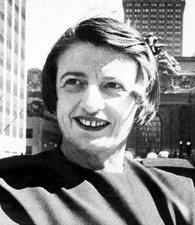Outlier and icon, enemy of altruism and champion of the free market, writer and philosopher, Ayn Rand was too extreme to be categorized by any single school of thought other than her own.
Ayn Rand’s Early Days
Ayn Rand was born Alissa Rosenbaum on February 2, 1905, in St. Petersburg, Russia. She was intrigued by Western culture, and read foreign magazines and the works of Romantic novelists such as Victor Hugo. By age 9, she had already decided to become a writer.
The Russian Revolution shattered the comfortable lifestyle Rand and her family enjoyed as private shop owners. Her father’s chemist shop was taken over by the Bolsheviks, and the once prosperous family became desperately poor.
Rand attended the University of Petrograd, where she learned philosophy and history. She also developed an interest in Hollywood. She studied screenwriting at the State Institute for Cinema Arts and made it her goal to get to America.
Under the guise of visiting relatives in 1926, Rand obtained a passport and departed for the United States, determined never to return. She moved to Hollywood and her movie career began when she was discovered lingering around the studio of then-famous director Cecil B. DeMille. He hired her as an extra, and then as a script reader, but she had neither financial nor literary success for many years.
Sources in this Story
- The Atlas Society: About Ayn Rand
- The Ayn Rand Institute: A Brief Biography of Ayn Rand
- University of Tennessee at Martin: Internet Encyclopedia of Philosophy: Ayn Rand (1905–1982)
- The New York Times: Ayn Rand’s Literature of Capitalism
- Reason Magazine: Ayn Rand at 100
- C-SPAN: Interview with Ayn Rand
- USA Today: Scandals Lead Execs to Atlas Shrugged
- Time: What Would Ayn Rand Have Done?
Rand’s Philosophy and Novels
She sold her first screenplay to Universal Studios in 1932. From there, her first play was produced in California and in New York. However, she had difficulty publishing her semi-autobiographical novel, “We the Living.” American intellectuals of the 1930s did not share Rand’s distaste for communism, and even after it appeared in 1936, it was not well received.
Her second novel, “The Fountainhead,” was rejected by 12 publishers, received bad reviews, but became a best seller anyway. It was Rand’s first vehicle for the ethical theories that would bring her both popular success and notoriety. Later in life, she would devote herself into developing her philosophy of Objectivism.
“Objectivism is rational self-interest and self-responsibility—the idea that no man is any other man’s slave,” explains Rockford College philosophy professor Stephen R. C. Hicks. “The virtues of her philosophy are principled policies based on rational assessment: rationality, productiveness, honesty (in order to rationally make the best decisions we must be privy to the facts), integrity, independence, justice, and pride.”
That theory is more fleshed out in her epic 1957 novel, “Atlas Shrugged.” Fifty years later, The New York Times considered it to be one of the world’s most influential business books. The novel has had a profound effect on business leaders, offering strong support for believers in a free market. Many cite the book as a reason why they were not afraid to pursue success.
The main draw of Rand’s works is that she sought not simply to show that selfishness was allowable, but that it was moral, and could serve the greater good.
Rand discussed her theories in a 1961 interview on the show “Our World.”
The Woman and Her Work
- “Atlas Shrugged”
- “The Fountainhead”
- “The Virtue of Selfishness”
- “We the Living”
- “My Years With Ayn Rand” by Nathaniel Branden
The Rest of the Story
Ayn Rand died in New York on March 6, 1982, but her legacy is still alive. Her most ardent followers have formed several organizations, such as the Ayn Rand Institute and the Atlas Society, which are devoted to the principles of Objectivism, as outlined in her book, “The Virtue of Selfishness.”
Writers and philosophers continue to explore the premises of her theories in such venues as the Objective Standard, a journal with the slogan, “Exploit the Earth or Die.”
Although she explicitly said she was not libertarian, she is often associated with the group’s philosophies. American capitalists and free trade supporters find inspiration in her ideas. An article in USA Today reported that in 2002, executives were using “Atlas Shrugged” to justify the kind of self-motivated behavior that had caused a slew of recent business scandals.
Similarly, when the first bailout package was proposed in September 2008, Time magazine thought it worthwhile to wonder, “What Would Ayn Rand Have Done?” An Objectivist think tank blamed government overregulation for the financial crisis and referred to the affected business leaders as “victims.”
This article was originally written by Rachel Balik; it was updated January 3, 2017.











